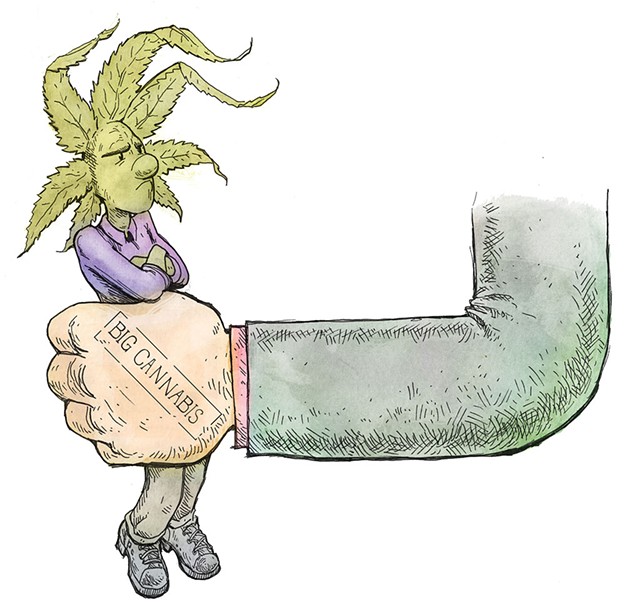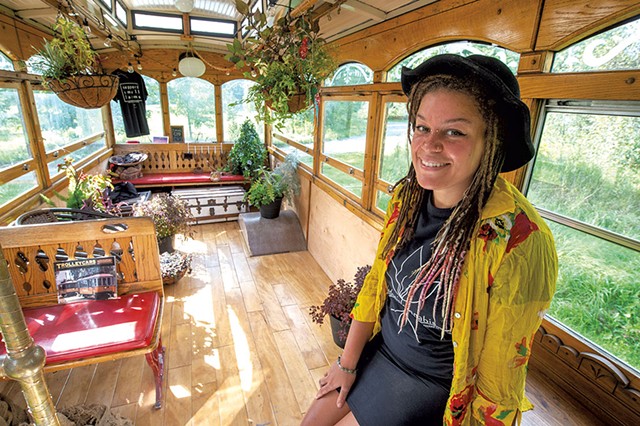click to enlarge 
Arantha Farrow's business plan never included selling marijuana products, but the Northeast Kingdom entrepreneur has recently come around to the idea. The 29-year-old owner of Caledonia Cannabis has sold cannabidiol (CBD) joints, tea and flower since 2018 and says adding marijuana to her product line would help her compete once Vermont's adult-use market opens next year.
But Farrow was disappointed to learn in late June that Toronto company Slang Worldwide, which owns the rights to brands that are distributed in 2,200 retail cannabis stores in the U.S., will acquire Vermont-based medical marijuana dispensary operator CeresMED for $25 million.
"When I hear about big, out-of-state investment, when I hear about this rush in this industry, it's disheartening," Farrow said. "I hope that there's ways that we as Vermonters can protect the land and protect the industry for our communities."
With the pending sale of CeresMED, Vermont's five medical marijuana licenses will be owned by out-of-state conglomerates. The Slang deal, which is not yet final, cemented advocates' fears that Big Cannabis will control the market in "buy local" Vermont. Some worry that the presence of these large companies will make it harder for the state to deliver on its promise to help women and Black, Indigenous and people of color succeed in the industry.
The out-of-state-owned dispensaries will also be allowed to sell marijuana for recreational use — and will get a head start doing it. By state law, medical cannabis license holders can open up shop in May 2022, five months earlier than the October 2022 start date for other Vermont retailers. Some advocates argue that this gives deep-pocketed companies an unfair advantage in what promises to be a lucrative market; industry experts estimate that recreational cannabis sales in Vermont will top $245 million by 2024.
Slang will operate CeresMED, which holds two medical licenses that allow it to operate dispensaries in Burlington, South Burlington, Brattleboro and Middlebury. New York-based iAnthus Capital Holdings, which owns the Grassroots Vermont medical dispensary in Brandon, operates 68 retail locations in the U.S. Curaleaf Holdings, a Massachusetts company, has 107 dispensaries in 23 states and owns medical licensees PhytoCare Vermont and Vermont Patients Alliance.
"If you let these dispensaries sell their own product on day one, they have testing, they have packaging, they have supply," said Eli Harrington, a cannabis consultant and event planner in Irasburg. "Basically, not only will they set the market, they're going to dictate the other terms."
Others in the state's cannabis scene think these fears are overblown. They point out that the law limits the state's current dispensary owners to one retail location each, which will prevent any single corporation from monopolizing the market. Medical marijuana license holders aren't "getting any real advantage over anybody else," said Burlington-based attorney Tim Fair, whose firm, Vermont Cannabis Solutions, represents locals in the pot biz. "Why is this a big deal? It's not."
Because cannabis is still banned under federal law, marijuana can't be shipped across state lines. Even big operators will have to acquire and process marijuana products within Vermont's borders. But advocates such as Harrington have long argued that the legislature has given medical dispensaries preferential treatment, better positioning them to enter the retail market.
In 2017, lawmakers allowed dispensaries to convert from nonprofit to for-profit businesses and to accept cash from out-of-state investors. The following year, Gov. Phil Scott signed into law a measure that permits Vermonters to grow their own plants at home. That likely hurt the medical program, which once had a high of about 5,700 people enrolled. As of late June, the number had dropped to about 4,800.
Medical dispensaries lobbied hard in 2019 to get access to "vertically integrated licenses" in the new recreational market. The permit allows them to act as growers, wholesalers, manufacturers and retailers, and to operate testing labs; other cannabis entrepreneurs, meanwhile, have to obtain one of each license type to perform the same tasks.
Sen. Dick Sears (D-Bennington), whose Senate Judiciary Committee has vetted Vermont's cannabis laws, opposes both the integrated license program and early market access for medical license holders. He worries that the established dispensaries, backed by large corporations, will undercut the small growers and disenfranchised groups that the law is supposed to protect.
"The medical facilities were providing an important service in Vermont when we didn't have any other way for medical patients to obtain marijuana, other than growing their own," Sears said. "They've maintained a valuable place in our system. The question now becomes, as we go to a legalized system, what is their role?"
Bridget Conry, director of brand experience for CeresMED, says dispensaries can use their first-move advantage and corporate backing to improve both the medical and recreational markets. Many medical cannabis users have asked the company to offer a wider variety of products that it couldn't previously afford, Conry said.
"If we can make it easier for patients to get on and stay on the registry without having to jump through a lot of hoops, there will be a lot of incentive for Vermonters to [stay in the medical program]: No taxes, no limits on dose/potency, and access to trained staff for consultation in a private setting," Conry said in an email.
CeresMED will now be able to purchase formulas and equipment from Slang, a publicly traded company that buys and sells product licenses, to expand its own product line. The company will support producers on the recreational side by selling craft products in its retail shop, Conry said.
"People in Vermont overwhelmingly want to be able to buy retail cannabis, and we want to be there to serve them," she said. "We have the infrastructure to be ready to do that now, and so we think that's a benefit for everybody."
The law requires integrated license holders to purchase 25 percent of their cannabis flower from a licensed small grower between August and October of next year. Conry said CeresMED has already signed agreements with two craft growers.
"We've always felt that for any industry to succeed, it needs players of all sizes — large, medium, small," she said. "There's room for everybody, and the whole market benefits if all those sizes exist. We have a lot of experience that we're looking forward to sharing."
Not every independent producer is feeling the love. Tito Bern, who has operated the Bern Gallery glass shop on Burlington's Main Street since 2004, intends to apply for both a retail and a cultivation license. But he says he won't sell his product to the established dispensaries, and "most growers" feel the same.
"[We] just don't trust the dispensaries or really see them as part of the team," he said.
Bern isn't intimidated by the dispensaries, but he does recognize that they have a leg up on legal weed. Well-capitalized businesses can purchase land or buildings outright — a necessity, since many banks won't lend to people selling a federally illegal substance — an opportunity that might be out of reach for smaller entrepreneurs. Bern, who has been growing his own weed since the 1990s, recently sank his life savings into a building that will host his future growing operation in Addison County. "I was born to be in this. I have no choice," he said.
click to enlarge 
- File: Jeb Wallace-Brodeur
- Arantha Farrow in her "Cannaboose" trolley in Hardwick
Farrow, of Caledonia Cannabis, worries that big corporations will buy up real estate and monopolize the market with an inferior, mass-produced product. But Dave Silberman, a Middlebury-based cannabis attorney, said it's unrealistic that the medical dispensaries, which can collectively only operate three adult-use stores, will control much of anything.
"If the existing players are selling bad product at high prices, there's an opportunity for you to come in and sell your better product at a better price for consumers," he said.
Burlington cannabis attorney Fair said that consumers will seek out quality cannabis in Vermont, already known for its craft beer, cheese and maple syrup. Like Silberman, Fair downplayed large corporations' influence, saying that they'll be more likely to invest in places that hand out multiple retail licenses. "We're simply too small for these companies," Fair said, noting that he wouldn't hesitate to sue if he learned that any company had managed to skirt the rules. "They can play, but they're gonna play by the same rules as everybody else."
In other states, corporate-owned dispensaries have not necessarily played by the rules. Massachusetts law limits license holders to just three retail locations, but a March 2019 Boston Globe investigation found that cannabis company Sea Hunter Therapeutics used five separate company names to apply for a dozen retail licenses. Last month, the state's Cannabis Control Commission fined Sea Hunter's parent company, Tilt Holdings, $275,000 for the scheme.
These corporate fines bear little resemblance to the punishment that has been meted out to people from marginalized communities, who have been disproportionately targeted in the war on drugs. In 2009, one of Fair's pro bono clients, who goes by the alias Jimi Smokez, was sentenced to a year at Northern State Correctional Facility for growing cannabis in his Burlington apartment. When he was released from prison, he said, he had to tell every prospective employer that he was a convicted felon.
"Guess what? Nobody hired me," Smokez said. "People told me, 'Go work in a nursery.' A nursery job, fortysomething-year-old Black man in Vermont? I don't know what dimension you in. I had picked up this skill over 15 years, and I couldn't perform it."
Smokez, who now lives in Colchester, is hoping to obtain a cultivation license and, eventually, offer consulting services to other growers. His felony conviction, he said, has made him anxious about going into legal business. "I'm overwhelmed," he said. "It's surreal. Once you're incarcerated and you lose your freedom, it's like a scar."
Vermont's cannabis laws direct the state to provide subsidies to help women and people such as Smokez to launch their businesses. The state's Cannabis Control Board, which will assume regulatory authority over the medical and recreational marijuana industries next January, has yet to hash out the specifics of the equity program.
Marlena Tucker-Fishman, who is Black, and her husband, Noah Fishman, are skeptical of the state's ability to create real equity in the emerging market. The couple, who own Zenbarn Farms, a CBD business in Waterbury, say they plan to apply for a retail cannabis license. They recently started a fund with the Richmond-based nonprofit Pennywise Foundation to help people of color do the same. Zenbarn Farms contributes 1 percent of its profits to the fund, which will help BIPOC entrepreneurs write business plans and obtain legal advice for entering the recreational cannabis market.
"This is a really ripe opportunity to create some much-needed social change," Noah Fishman said. "We're not going to wait for the state. We're going to do this."
Correction, July 15, 2021: A previous version of this story misstated the scope of Slang Worldwide’s operations. In addition, it incorrectly described CeresMED’s ownership structure and slightly mischaracterized dispensaries’ lobbying efforts in 2019.









































































